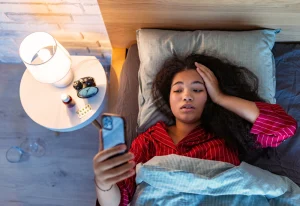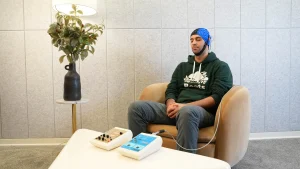In the fast-paced world we navigate today, stress has become an unwelcome companion for many. The demands of daily life, coupled with external pressures, can create a chaotic mental landscape. However, in the pursuit of tranquility, besides of several effective stress management techniques, innovative approaches such as Neurofeedback, Biofeedback, Transcranial Magnetic Stimulation (TMS), Photobiomodulation, and counseling are emerging as valuable tools. This blog aims to explore these cutting-edge services and how they can be integral parts of a holistic approach to transforming chaos into calm. Alongside, we’ll address some common myths and facts surrounding stress management techniques.
Understanding the Chaos of Stress:
The Modern Stress Epidemic – Modern life is rife with stressors — from work-related pressures and societal expectations to personal challenges. Understanding the sources of stress is crucial for developing effective strategies to manage it.
The Mind-Body Connection – Stress is not solely a mental burden; its effects manifest physically. Chronic stress can contribute to various health issues, including cardiovascular problems, weakened immune systems, and mental health disorders.
Myths and Facts about Stress Management:
A – Myth: “All Stress is Bad.”
Fact: Not all stress is harmful. Positive stress, known as eustress, can motivate and enhance performance. It’s chronic, unmanaged stress that poses health risks.
B – Myth: “You Can Eliminate Stress Completely.”
Fact: Stress is a natural part of life. Instead of eliminating it entirely, focus on developing effective coping mechanisms and resilience.
C – Myth: “Relaxation Techniques are One-Size-Fits-All.”
Fact: Individuals respond differently to relaxation techniques. It’s essential to explore and find what works best for you, whether it’s mindfulness, deep breathing, or other methods.
D – Myth: “Only ‘Big’ Life Events Cause Stress.”
Fact: Daily hassles and ongoing challenges can accumulate stress over time. Recognizing and addressing these smaller stressors is key to overall well-being.
E – Myth: “Ignoring Stress Will Make It Go Away.”
Fact: Ignoring stress can exacerbate its impact on mental and physical health. Acknowledging and actively managing stress is crucial for long-term well-being.
There are several effective stress management techniques and solutions that individuals can incorporate into their daily lives. Here are some widely recognized approaches:
Mindfulness and Meditation:
Mindfulness Practices – Engage in mindfulness activities, such as mindful breathing, meditation, or yoga. These practices help bring attention to the present moment, reducing anxiety and promoting mental clarity.
Deep Breathing Exercises – Practice deep breathing exercises to activate the body’s relaxation response. Techniques like diaphragmatic breathing or box breathing can be done anywhere and help calm the nervous system.
Physical Exercise:
Regular Exercise – Incorporate regular physical activity into your routine. Exercise has proven benefits for both physical and mental health, releasing endorphins that act as natural mood lifters.
Relaxation Techniques:
Progressive Muscle Relaxation (PMR) – PMR involves tensing and then gradually releasing different muscle groups, promoting physical and mental relaxation.
Guided Imagery – Use guided imagery to visualize calming scenes or positive outcomes. This technique can reduce stress and promote a sense of peace.

Lifestyle Adjustments:
Time Management – Prioritize tasks, set realistic goals, and manage time effectively. Breaking tasks into smaller, manageable steps can make overwhelming situations more manageable.
Healthy Sleep Habits – Establish a consistent sleep routine and prioritize good sleep hygiene. Quality sleep is crucial for overall well-being and stress management.
Social Connections:
Social Support – Cultivate and maintain strong social connections. Talking to friends or family members about stressors can provide emotional support and different perspectives.
Laughter and Humor – Incorporate humor into your daily life. Laughter has been shown to reduce stress hormones and increase the production of endorphins.
Creative Outlets:
Art and Creativity – Engage in creative activities like painting, drawing, or writing. Expressing oneself through art can be a therapeutic way to cope with stress.
Music Therapy – Listen to calming music or engage in playing a musical instrument. Music has the power to influence mood and evoke emotional responses.
Cognitive Behavioral Techniques:
Cognitive Restructuring – Challenge and reframe negative thought patterns. Restructuring helps individuals develop more positive and realistic perspectives.
Journaling – Keep a journal to document thoughts and feelings. Writing can be a cathartic way to process emotions and gain insights into stress triggers.
Nature and Outdoor Activities:
Nature Walks – Spend time in nature. Going for a walk in a park or spending time outdoors can have a calming effect on the mind.
Aromatherapy – Use scents like lavender or chamomile, known for their calming properties. Aromatherapy can be incorporated through essential oils or scented candles.
Holistic Approaches:
Acupuncture – Acupuncture involves inserting thin needles into specific points on the body. Some individuals find it effective in reducing stress and promoting relaxation.
Herbal Teas – Certain herbal teas, such as chamomile or valerian root, are known for their calming properties. Enjoying a warm cup of tea can be a soothing ritual.

Innovative Solutions and Professional Support for Stress Management:
Neurofeedback:
What is Neurofeedback? – Neurofeedback, also known as EEG biofeedback, is a non-invasive technique that monitors brainwave activity. By providing real-time feedback, individuals can learn to regulate and optimize their brain function.
How Neurofeedback Helps
Enhanced Stress Response: Neurofeedback can help individuals regulate their stress response by training the brain to achieve more balanced patterns of activity.
Improved Emotional Regulation: By addressing irregular brainwave patterns, neurofeedback may contribute to better emotional regulation, reducing the impact of stress on mental well-being.
Biofeedback:
What is Biofeedback? – Biofeedback involves monitoring physiological processes such as heart rate, muscle tension, and skin conductance. Through feedback, individuals can learn to consciously control these bodily functions.
How Biofeedback Helps:
Physical Relaxation: Biofeedback helps individuals recognize and control physical signs of stress, promoting relaxation and reducing the overall stress burden.
Mind-Body Harmony: By training the mind to influence the body’s responses, biofeedback fosters a holistic approach to stress management.
Transcranial Magnetic Stimulation (TMS):
What is TMS? – TMS is a non-invasive procedure that uses magnetic fields to stimulate nerve cells in the brain. It’s often used in the treatment of depression and other mental health disorders.
How TMS Helps:
Alleviating Depressive Symptoms: For those whose stress has led to depression, TMS can be an effective intervention by modulating neural activity and improving mood.
Enhancing Resilience: TMS may contribute to enhanced neural resilience, helping individuals better cope with stressors.
Photobiomodulation (PBM):
What is PBM? – PBM, or light therapy, involves the use of low-level light to stimulate cellular function. It has shown promise in various applications, including mental health.
How PBM Helps:
Mood Regulation: PBM may contribute to mood regulation by modulating inflammation and promoting cellular repair.
Cognitive Enhancement: Some studies suggest that PBM could enhance cognitive function, aiding in better stress management through improved cognitive resilience.
Counseling:
What is Counseling? – Counseling involves talking to a mental health professional to explore and address emotional and psychological challenges.
How Counseling Helps:
Emotional Support: Counseling provides a safe space to express and process emotions related to stress, offering valuable emotional support.
Coping Strategies: Counselors can equip individuals with practical coping strategies to navigate stressors effectively.
Each individual’s stress profile is unique. A personalized approach that combines different modalities based on individual needs can be the most effective strategy. Seeking guidance from mental health professionals who specialize in these services ensures a tailored and evidence-based approach to stress management.
Conclusion:
Navigating the transition from chaos to calm involves embracing a holistic approach to stress management. With cutting-edge services like Neurofeedback, Biofeedback, TMS, Photobiomodulation, and counseling, individuals can embark on a transformative journey toward reclaiming their mental space and fostering a sense of enduring calmness amid life’s challenges. By debunking myths and understanding the facts about stress management, individuals can make informed decisions and take proactive steps towards a calmer, more resilient self.
Elumind Centres for Brain Excellence is an integrated mental health centre offering solutions that can help you with your mental/brain health needs. To start your journey, book your FREE 15-MINUTE PHONE CONSULTATION. We are here for you.









